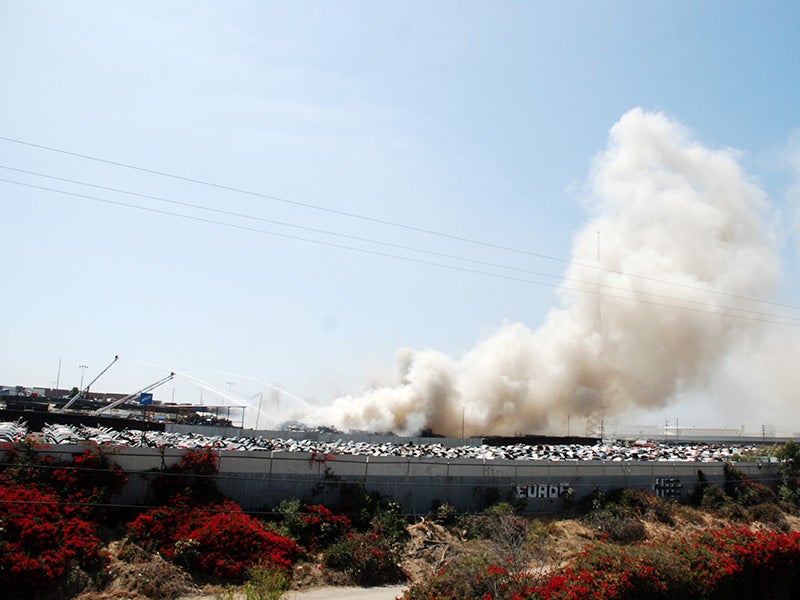Scrapping the Recycling Industry’s Green Image
Not all recycling is as green as it may seem.

This page was published 11 years ago. Find the latest on Earthjustice’s work.
Last month, I toured a scrap recycling facility as part of a weeklong conference put on by the Society of Environmental Journalists in New Orleans, Louisiana. As an Earthjustice employee who has written before about recycling’s dark side, I was curious to hear the industry’s take on the health impact of scrap recycling.
Now don’t get me wrong—I love recycling. After all, it saves valuable resources, creates jobs and reduces landfill waste. But if done haphazardly, the crushing, melting and processing of our used goods can pollute our environment in all kinds of ways, especially if those goods happen to be the 1.5 million tons of hazardous waste created by steel, chemical, pharmaceutical and other industries each year.
Jesse Marquez, an Earthjustice client and founder of the Wilmington Coalition for a Safe Environment in southern California, knows firsthand how dangerous it can be to live near a hazardous waste recycling facility. In June 2010, an explosion rocked his waterfront town after a lawnmower gas tank was allegedly punctured at the town’s local “Pick Your Part” junkyard—the final resting place for many old cars, trucks and other vehicles. The fire took more than 30 hours to put out, partly because of a lack of fire hydrants and road access for firefighters.
As I boarded the tour bus, Marquez’s story was definitely on my mind, but I was soon brought back to the present as the tour leader began to speak.
“The recycling industry is one of the most heavily regulated industries in the country,” began Kent Kiser, the tour leader and publisher at the Institute of Scrap Recycling Industries (ISRI), a trade group representing the scrap industry.
That’s an odd characterization, I thought, especially given that in 2008 the Bush administration passed an eleventh-hour rule that effectively eliminated federal oversight of hazardous waste recycling sites. Kiser didn’t mention that part, but as I would come to find out after the tour, over the past two decades the recycling industry, and ISRI in particular, has played a major role in pushing to de-regulate the scrap recycling industry. In addition to exemptions from hazardous waste management requirements under the Resource Conservation and Recovery Act, ISRI’s lobbying efforts paid off in 1999, after Congress passed the Superfund Recycling Equity Act, which exempts recycling facilities from any legal liability that may come from selling its goods to an irresponsible buyer. Basically this means that companies can sell their scrap to anyone they want and wash their hands of any damages that occur after the fact. The only catch is that the seller must take “reasonable care” in determining the environmental compliance status of the buyer.
As an ISRI PowerPoint presentation makes clear, scrap shippers strongly dislike the Superfund law, which regulates our nation’s hazardous waste sites, because it opens them up to costly lawsuits and cleanups. In order to keep them out of legal hot water and hefty financial liability, groups like ISRI do the surveying of buyer facilities and document that process for its members for a fee. Since the federal EPA never released official guidance on what “reasonable care” means, it’s unknown whether the provision is sufficient to prevent environmental harm. What is known, however, is that there are currently more than 200 contaminated sites from hazardous waste recycling operations across the country, including more than 100 Superfund sites.
In 2009, Earthjustice, together with the Sierra Club, challenged the midnight rulemaking by the Bush administration in federal court. The lawsuit, coupled with broad-based citizen action, successfully pressured the federal EPA in 2011 into proposing changes to the hazardous waste rule, thereby reinstating some of the strict standards of the original regulations, as well as removing long-standing dangerous exemptions for many other hazardous waste recyclers, like scrap metal recyclers.
Since then, ISRI has fought hard to ensure that scrap metal recyclers are exempted from any new requirements while touting the industry’s reputation as “environmental stewards.” Most recently, ISRI met with representatives of the Office of Management and Budget (OMB) and EPA in March 2014 to argue that the scrap recycling industry should not have to follow the same rules as other industries that handle hazardous waste. The industry’s argument is essentially that recycled goods are “products” and not “waste” and therefore should not be regulated as such. Earthjustice and a whole host of other environmental and health groups disagree, arguing that exempting the scrap recycling industry from all hazardous waste management regulations since the 1990s has resulted in unsafe conditions and the release of hazardous waste, or “products” like particulate matter, dioxins and heavy metals. In addition, fires, spills and airborne emissions have injured fenceline communities and workers across the nation.
Says Earthjustice attorney Lisa Evans, who specializes in hazardous waste law, "These facilities should comply with the same safeguards required of other industries handling hazardous waste. Such rules are designed to keep communities safe and prevent the creation of more Superfund sites. Anything less places neighborhoods and workers in danger."
The California Regional Office fights for the rights of all to a healthy environment regardless of where in the state they live; we fight to protect the magnificent natural spaces and wildlife found in California; and we fight to transition California to a zero-emissions future where cars, trucks, buildings, and power plants run on clean energy, not fossil fuels.